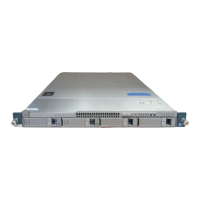1-10
Cisco Nexus 1000V for Microsoft Hyper-V Installation Guide, Release 5.2(1)SM1(5.2)
OL-30997-01
Chapter 1 Installing the Cisco Nexus 1000V for Microsoft Hyper-V
Installing the VSM Software
See Table 1-1 for more information about the Cisco Nexus 1000V ISO boot options.
Ta b l e 1-1 Cisco Nexus 1000V ISO Boot Options
No Boot Option If the disk is unformatted If disk is formatted
1 Install the Cisco
Ne
xus 1000V and
bring up the new
image
• Boot the kickstart image
from ISO
• Format the disk and copy the
images from ISO to
bootflash:
• Load the system image
• Boot the kickstart image from
ISO
• Copy the images from ISO to
bootflash:
• Load the system image
2 Install the Cisco
Ne
xus 1000V and
go to the VSH shell
• Boot the kickstart image
from ISO
• Format the disk and copy the
images from ISO to
bootflash:
• Start the VSH shell
• Boot the kickstart image from
ISO
• Copy the images from ISO to
bootflash:
• Start the VSH shell
3 Install the Cisco
Ne
xus 1000V only
if the disk is
unformatted, and
bring up the new
image
• Boot the kickstart image
from ISO
• Format the disk and copy the
images from ISO to
bootflash:
• Load the system image
• Boot the kickstart image from
ISO
• Try to load the system image
from the disk with the same
name as that in ISO
• If the image is not found, start
the VSH shell
4 Install Cisco Nexus
100
0V only if the
disk is unformatted
and go to the VSH
shell
• Boot the kickstart image
from ISO
• Format the disk and copy the
images from ISO to
bootflash:
• Load the system image
• Boot the kickstart image from
ISO
• Start the VSH shell
Configuring the VSM
After installing VSM using a VM template, connect to a VM console and configure the VSM. We
recommend that the VSM is deployed using the template provided by Cisco. After the deployment is
complete, power on the VSM. The following basic inputs are required for the VSM configuration:
1. Switch name
2. Domain ID
3. Management address
4. Subnet mask
5. Gateway address

